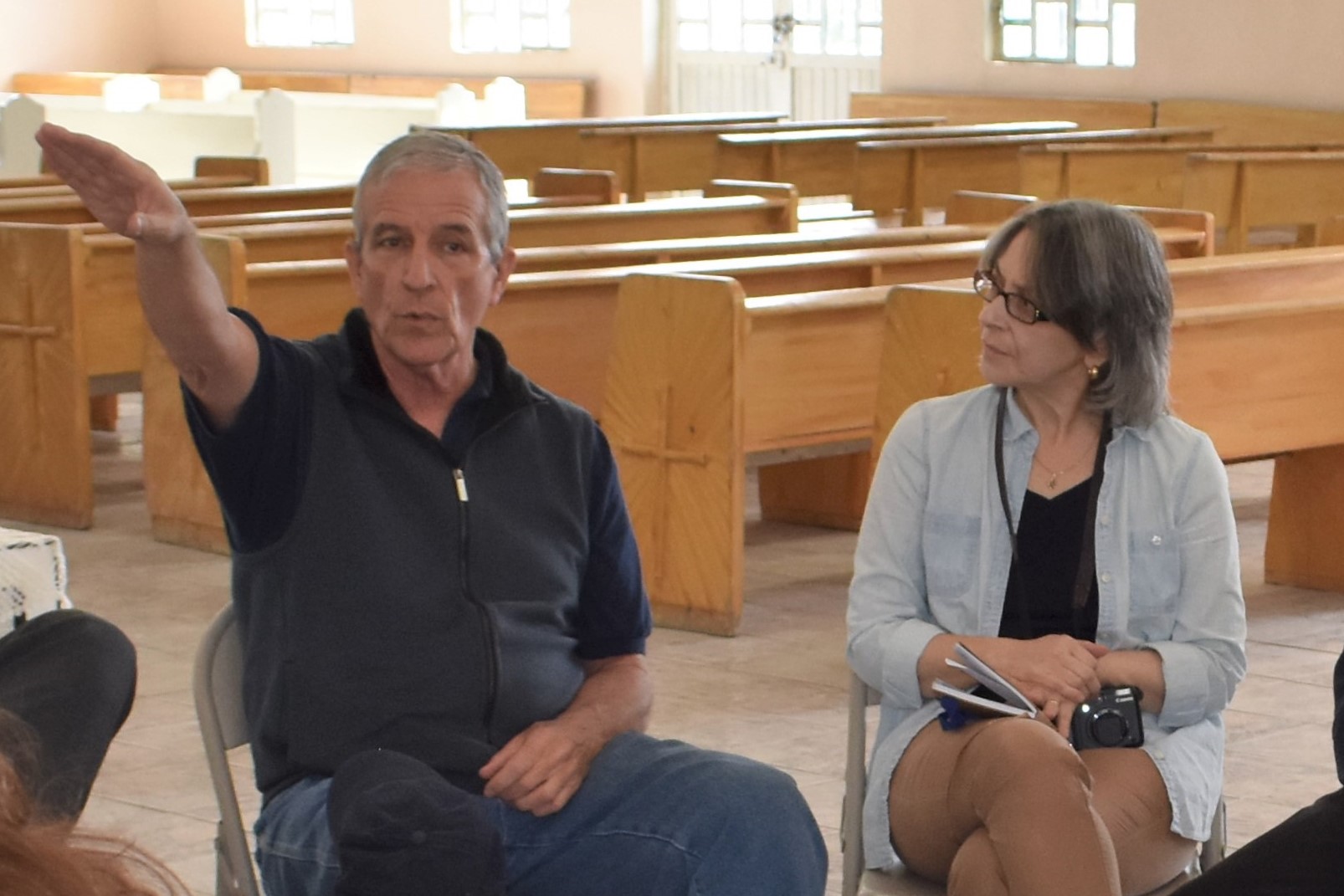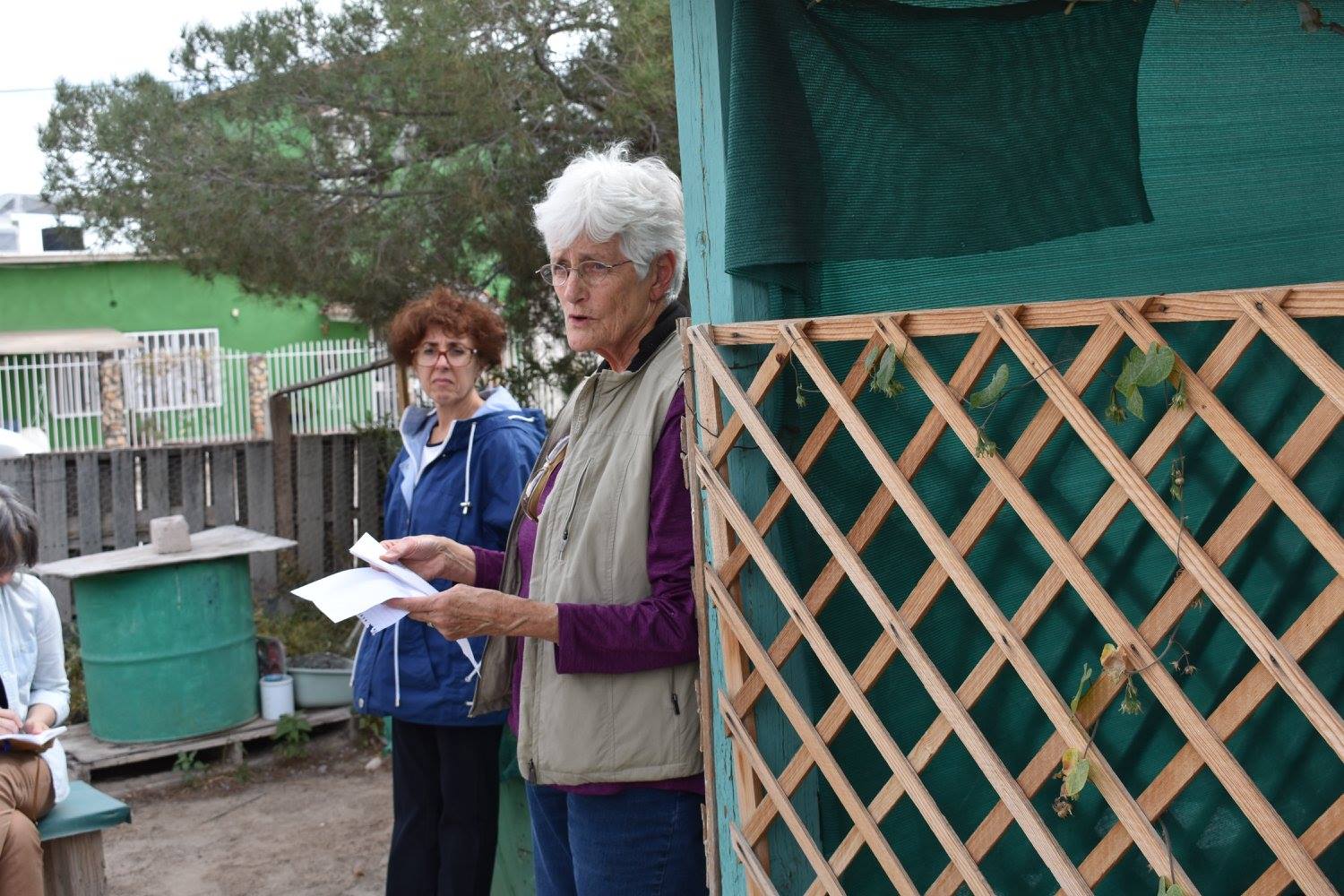Encuentro: Reflecting on Border Immersion Experience, part 2
share
From November 6-10, the Sisters of Mercy sponsored the second annual Border Immersion Experience, an event at the U.S.-Mexico border where participants witnessed some of the conditions experienced by immigrants on the southern border. We’ll be sharing their reflections in two parts. Today we hear from Clara Lombardi, a Mercy employee, and Sister Kathleen Erickson.
Read part 1 with reflections from Sisters Eileen Trainor and Rita Valade.
Drawn to Look Closer, by Clara Lombardi, communications specialist for the Sisters of Mercy Mid-Atlantic Community

It was sobering to see in person the border wall that already exists, to touch it, to put my arm through the slats. We saw how drastically different the landscape is when crossing the border from El Paso, Texas, into Juarez, Mexico. Juarez is visibly poorer with neglected, empty buildings; dusty, sometimes nonexistent roads; and puddles of water along the roadside even when there hasn’t been rain. About half the water in Juarez is lost to leaks due to corrupt business practices and shortcuts in construction.
I knew that the North American Free Trade Agreement (NAFTA) in 1994 had an impact on how people in Mexico worked. We learned specifically how Article 27 of the Mexican Constitution was revised to accommodate it, privatizing land that had previously been held in common and then bought up by multinational companies and big-agriculture industrial farming. People’s communities and agrarian lifestyle were disrupted; many left because they could no longer make a living where they were. Mexico used to be self-sufficient in corn; now 60 percent of corn crops are owned by Conagra, a large-scale food service and food production company based in Chicago, Illinois.
“Part of the pain of the moment is that truths are being denied,” said Ruben Garcia, director and founder of Annunciation House, a refugee shelter in El Paso. “We solve the problem by forgetting the problem,” said Carlos Marentes of the Border Farmworkers Center in El Paso, which he and his wife founded in 1995.
Those phrases resonated with me. I’m aware of the issues, I support immigration reform, I don’t believe in the use of detention centers and I recognize the United States’ culpability—but I’ve kept them at a bit of an arm’s length. There’s so much; it’s overwhelming; where do you start?
But the people we met at the border were the answer to that.
In the El Paso/Juarez area, along with Ruben Garcia and Carlos Marentes, we met a parish priest who works with parishioners on human rights issues; a woman who has created a children’s library and after-school program; religious sisters who run a special-needs clinic; the deputy director of a migrant and refugee legal services office; a doctor who is also a social worker and lawyer to her patients; a librarian who tracks and collates statistics on violence in Mexico; and members of a human rights advocacy group. We attended workshops in Nogales in which not only the presenters, but also the attendees were activists and advocates who had come from around the country to participate and share. And in the very group I traveled with, we had a mix of human rights activists, educators, social workers and communicators, there to learn and later, to share our experiences.
Each person we met serves a need; each does her or his part. Together they contribute to the whole. Meeting them, I was drawn to look closer and learn more about the systems that have created the present-day situation; by deepening my own understanding, I will be able to more clearly share with others.
Ruben Garcia said it to us this way: “You have to figure out how to stand at the foot of the cross where you are.”
I encourage all to examine where you are being called to look closer, and then to act on it “where you are.”
Find Your Own Encuentro, by Sister Kathleen Erickson

Encuentro: an encounter; to go out to meet, to find out.
The Mercy Border Immersion experience encompassed three days in the El Paso, Texas/Juarez, Mexico area, a reflective drive in the desert along the border, and the School of the Americas (SOA) Encuentro in Nogales. It was an intense and valuable experience for members of the Mercy community. We went out of our comfort zones; we met one another and so many others; we learned, laughed, cried, reflected and shared an experience that would change each of us in ways we still don’t realize.
We saw glimmers of how the journey from the head to the heart works. There is such a difference between reading, hearing or watching videos about something and actually having the experience. We heard from Border Patrol agents, immigrants and people who work with immigrants’ legal cases. We noted how good people are part of systems that are arbitrary and even cruel. We swallowed the deepening realization that we have unknowingly lived as beneficiaries of other people’s poverty. We were inspired by incredible, generous ministries to help and empower immigrants: shelters, law offices, human rights organizations, a children’s library and medical services. We were challenged.
Our journey to the border was part of the process we all undergo in our search for the best of humanity in a divided world. I hope many more coworkers, Mercy Associates and others connected with the Mercy community will consider going out to find their own encuentro.
Are you ready for your own encuentro? Mercy is planning additional immersion experiences at the border. If you think you might be interested, please contact justice@sistersofmercy.org.